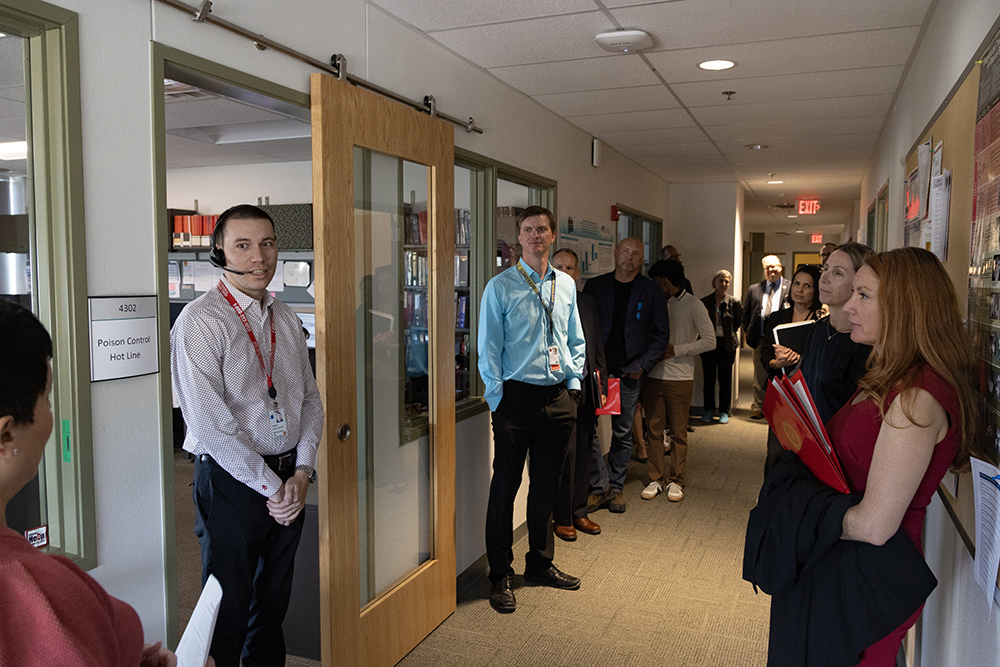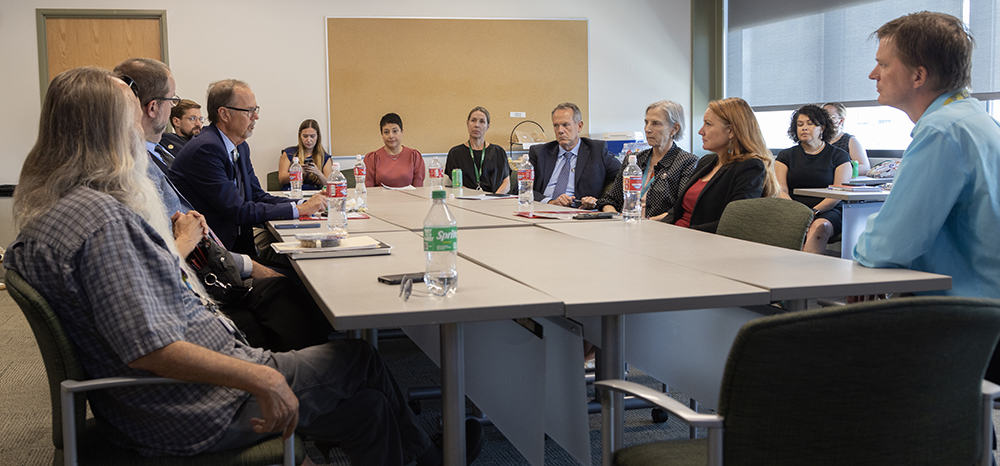The poison hotline is a number you might not think to call for drug addiction, but it’s one that could make all the difference. Leaders at the New Mexico Poison & Drug Information Center at The University of New Mexico Health Sciences Center want more families to know that that can call them the hotline when they are experiencing a crisis.
And it is a crisis. According to the New Mexico Department of Health, every 8.5 hours, a New Mexican dies from drug overdose. More than a thousand lives are lost each year, and that number continues to grow alongside increased access to fentanyl, heroin, methamphetamine and cocaine.
“You've got to almost live under a rock not to know someone personally (who has been affected by these drugs) or not know it's a problem,” said Brandon J. Warrick, MD, who is the Center’s associate medical director. “Most people know somebody—a friend, a family member, a work colleague—somebody that they're close to, who's either died or had problems with a substance use disorder, and an issue statewide and nationally.”
In addition to serving in a leadership post at the Center, Warrick is also core teaching faculty of addiction medicine at UNM’s School of Medicine. During his 10-year-long career at UNM, he said he’s had a front row seat to the devastation drug-use disorders have caused among countless New Mexico families. Four years ago, he decided to do something about it.
How the Poison Center Helps with Drug Use Disorders
In 2020, the New Mexico Poison & Drug Information Center dedicated some of its poison phone lines specifically for addiction. Warrick said, initially, the service was primarily for rural hospitals to reach out for guidance on addiction treatment. Before he knew it, calls from the public started coming in. Since then, Warrick and has team have dedicated more time and funding to the program to expand care and their message that-- help is always available.
The poison hotline is free, confidential, and staffed by pharmacists and a pharmacy technician trained in toxicology and addiction medicine 24 hours a day, seven days a week. Language translation services are available as well, including in Spanish and Navajo.
These health care professionals are well equipped to treat and advise patients experiencing substance use disorder to street drugs. They can connect patients experiencing severe overdose or withdrawal symptoms with emergency services. They can also connect them with primary care resources and prescribe medications to further support their recovery. Narcan resuscitation kits and fentanyl test strips are available at no cost to those who call as well.
Poison center representatives said calling the hotline before going to an emergency room can help patients save time and money, if they do not need emergency services. If emergency services are needed, calling the poison center team ahead of time can also expedite care by connecting with and advising other UNM Health medical teams before a patient arrives to the emergency room.
The poison hotline receives close to 200 addiction calls a year, but they have the capability to take so many more.
“We have the capacity as a poison center to seek out help and look for resources, and we have the ability to answer more of those calls,” Warrick said. “We want you to give us a call, we want to be able to help you.”
National Attention
Warrick also said New Mexico’s Poison & Drug Information Center is the only one in the country currently doing this work.
“The poison center in Dallas is learning from us,” he said. “By the end of 2024, we anticipate they are going to start taking calls as well.”
 This work has attracted the attention of lawmakers. In early August, Rep. Melanie Stansbury, D-N.M., visited the Center. New Mexico’s Congressional delegation has proposed $1.4 million in additional, targeted funding in the final FY25 appropriations package for the Center to expand its services around information and assistance for both urban and rural New Mexicans who may be battling opioid addictions, exposure to environmental toxins, and for those seeking urgent help with potentially fatal medication errors.
This work has attracted the attention of lawmakers. In early August, Rep. Melanie Stansbury, D-N.M., visited the Center. New Mexico’s Congressional delegation has proposed $1.4 million in additional, targeted funding in the final FY25 appropriations package for the Center to expand its services around information and assistance for both urban and rural New Mexicans who may be battling opioid addictions, exposure to environmental toxins, and for those seeking urgent help with potentially fatal medication errors.

“We had a great discussion on how critical the Center is for New Mexico as a valuable resource for so many across the state, including parents, providers, 911 staff, and community members who have concerns about ingested substances and what to do,” said Doug Ziedonis, MD, MPH, Executive Vice President of UNM Health Sciences and CEO of the UNM Health System, after attending Stansbury’s visit.
“The Poison Center is becoming part of a sustainable system of preventing and tackling substance use disorders. They are getting calls related to people ingesting substances, but also in asking for how to get help. The Poison Center might serve a bigger role in helping practitioners and community groups better address addiction and its impact, including prevention and early intervention at critical moments.”
How can you or a loved one seek help?
“Not having insurance, is all too common, and in order to meet people where they are, I think it's important to be able to provide a no cost service to New Mexicans who are most in need of help,” Warrick said.
Warrick said addiction exists all around us in many different forms. It is common for drug use disorders to take over until patients lose their jobs, homes, money and even loved ones.
“I think it’s important to be available to New Mexicans on their terms and on their timeline,” Warrick said. “There's a moment when people are ready for help, and we don't always know when that is.” He said his team’s goal is to help people as soon as they reach out and try their best not to make them wait.
For those personally struggling to make that call—
“There's a lot of hope,” Warrick said. “My goal is to try to help New Mexicans out, and seeing the problem that we have with drug overdose deaths and families being affected by it—I want to help.”
